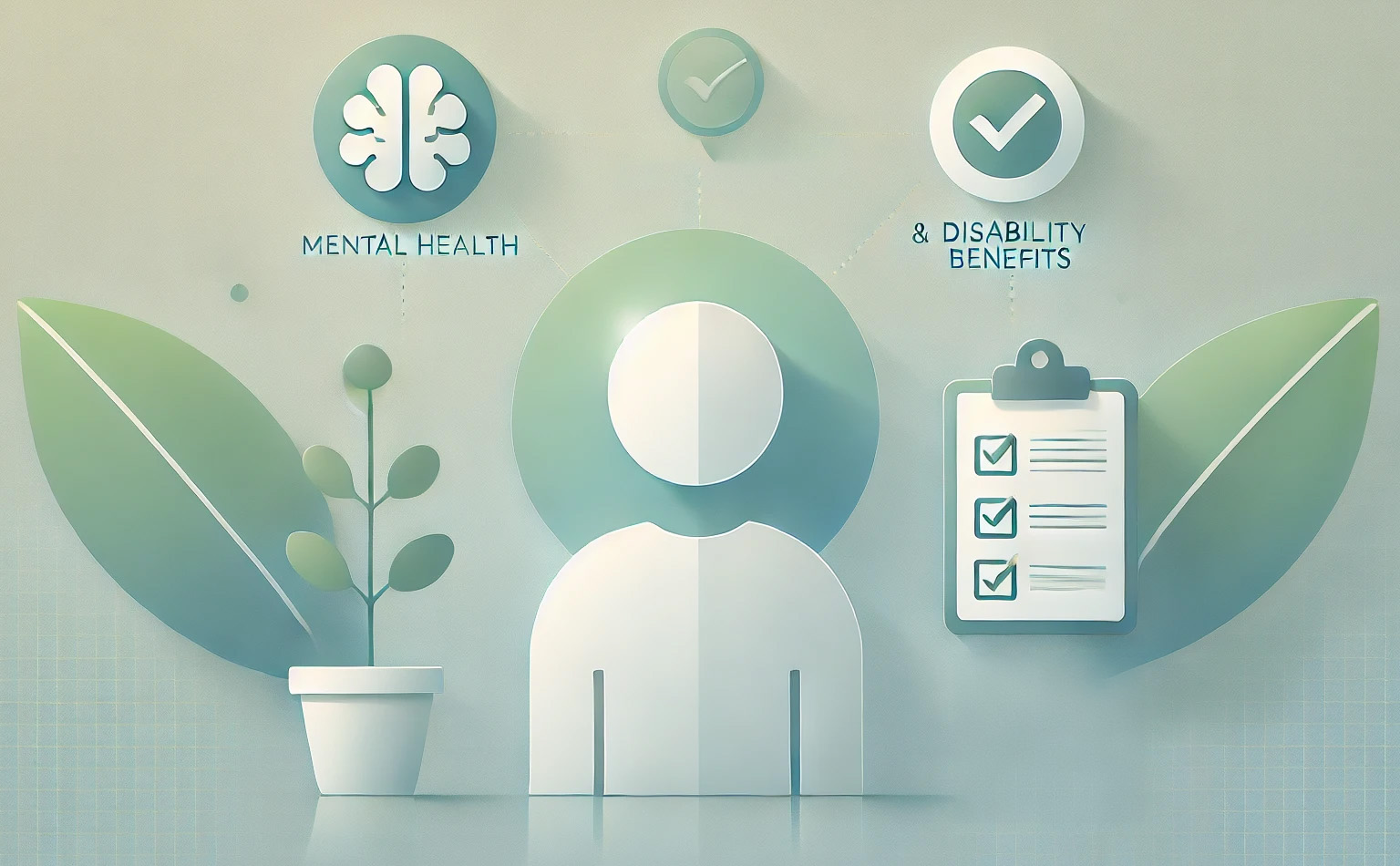By Brett McArthur, Attorney at Law
Mental health conditions affect millions of Americans each year. In fact, according to the National Institute of Mental Health, 22.8% of U.S. adults experienced mental illness in 2021—that’s nearly 58 million people. For many, these conditions are manageable with therapy, medication, and support systems, allowing them to lead productive lives. However, for others, mental health issues become debilitating, making it impossible to maintain full-time, competitive employment.
At the McArthur Law Office, I receive one to two phone calls a week from people seeking disability benefits based solely or primarily on mental health conditions. These calls often come from individuals who once held steady jobs but have found themselves unable to function consistently due to their mental health. If this sounds like you or someone you know, this article will guide you through the process of seeking Social Security disability benefits for mental health conditions, including the standards you need to meet and how an attorney can help.
Understanding Mental Health and Disability
Mental health conditions like major depression, bipolar disorder, PTSD, and anxiety disorders can be just as disabling as physical ailments. Over time, these conditions can erode your ability to maintain a routine, interact with others, or focus on tasks—all of which are essential for sustaining full-time work. I’ve seen countless cases where a claimant’s symptoms, such as emotional swings, difficulty concentrating, and withdrawal from social activities, made competitive employment impossible.
The Social Security Administration (SSA) recognizes that mental health conditions can cause significant functional limitations. However, receiving disability benefits based on mental health requires meeting specific criteria, which we’ll explore in detail.
The Social Security Standard for Disability
The standard for proving disability due to a mental health condition is essentially the same as for a physical condition: you must demonstrate that your condition prevents you from engaging in full-time, competitive employment in the national economy.
This means showing:
- You cannot return to your previous work. If you have a work history, you must prove that your mental health condition makes it impossible to perform the tasks of your past job.
- You cannot perform any other type of work. The SSA will assess whether there are any other jobs in the national economy that you could do full time, even if they are very different from your previous work.
To meet these requirements, you’ll need thorough documentation of your condition, its impact on your daily life, and how it limits your ability to work.
Mental Health Conditions Recognized by Social Security
The SSA categorizes mental health disabilities into the following general categories:
- Neurocognitive Disorders
These conditions affect cognitive functions such as memory, attention, and decision-making. Examples include dementia and traumatic brain injury. - Schizophrenia Spectrum and Other Psychotic Disorders
These disorders are characterized by delusions, hallucinations, or other severe disruptions in thought processes. - Depressive, Bipolar, and Related Disorders
Major depression and bipolar disorder can significantly impair your ability to maintain focus, energy, and emotional stability. - Intellectual Disorder
This category includes conditions that limit intellectual functioning and adaptive behavior, such as developmental delays. - Anxiety and Obsessive-Compulsive Disorders
Disorders like generalized anxiety, panic disorder, and OCD can cause severe distress and difficulty functioning. - Somatic Symptom and Related Disorders
These conditions involve significant distress or impairment due to physical symptoms that may not have a clear medical explanation. - Personality and Impulse-Control Disorders
These include conditions like borderline personality disorder, which can affect interpersonal relationships and emotional regulation. - Autism Spectrum Disorder
Autism can affect communication, social interactions, and behavior in ways that may prevent consistent work. - Neurodevelopmental Disorders
This category includes conditions like ADHD that impact developmental and cognitive functioning. - Eating Disorders
Disorders such as anorexia and bulimia can cause severe physical and psychological impairments. - Trauma- and Stressor-Related Disorders
PTSD and related conditions fall into this category, often stemming from traumatic events.
Meeting Social Security’s Criteria for Mental Health Disability
To qualify for disability benefits, you must provide evidence that your mental health condition meets or equals the severity outlined in the SSA’s Blue Book of impairments. The SSA evaluates mental health conditions based on specific criteria, such as:
- Medical documentation of the condition. This includes diagnoses, treatment records, and notes from mental health professionals.
- Functional limitations. The SSA will look at how your condition affects your ability to:
- Understand, remember, and apply information.
- Interact with others.
- Concentrate, persist, or maintain pace.
- Adapt to changes or manage yourself in a work environment.
If your condition does not meet the Blue Book criteria, you can still qualify by demonstrating that your symptoms and limitations are equivalent in severity to a listed impairment.
Common Challenges in Mental Health Disability Cases
Mental health claims face unique challenges compared to physical disability claims. Here are a few common hurdles:
- Subjective Symptoms
Unlike physical conditions, mental health symptoms are often subjective and harder to measure. For example, there’s no lab test to prove the severity of depression or anxiety. Tip: Work with your doctor or therapist to provide detailed records of your symptoms and their impact on your daily life. - Inconsistent Treatment History
Many claimants struggle to access consistent mental health care due to financial barriers or stigma. Unfortunately, gaps in treatment can weaken your case. Tip: Explain any treatment gaps to the SSA and emphasize your efforts to seek care when possible. - Perception of Improvement
If treatment has helped alleviate some symptoms, the SSA might assume you’re capable of working. Tip: Document any ongoing limitations, even if your condition has improved with treatment.
How an Attorney Can Help
Navigating the disability claims process can be overwhelming, especially when you’re already dealing with the challenges of a mental health condition. That’s where an experienced attorney can make all the difference. Here’s how I can help:
- Building a Strong Case: I’ll work with you and your medical providers to gather the evidence needed to prove your limitations.
- Communicating with the SSA: From completing paperwork to handling appeals, I’ll ensure the SSA has all the information they need to make a fair decision.
- Representing You in Hearings: If your claim is denied, I’ll represent you before an administrative law judge and advocate for your right to benefits.
Conclusion
Yes, you can receive disability benefits for mental health conditions, but it’s not always an easy process. You’ll need to demonstrate how your condition prevents you from maintaining full-time, competitive employment and provide thorough documentation to back up your claim.
If you’re considering applying for disability benefits or have been denied, I’m here to help. At the McArthur Law Office, we understand the challenges of living with a mental health condition and are committed to helping you secure the support you need. Give us a call today to schedule a consultation—we’re just a phone call away at 402-421-8333.





